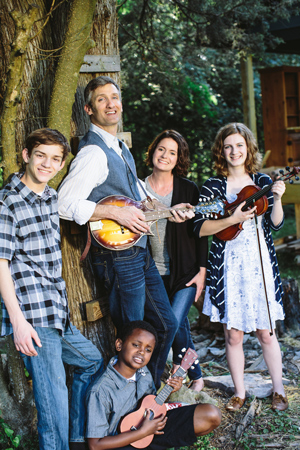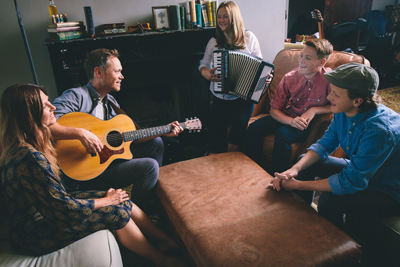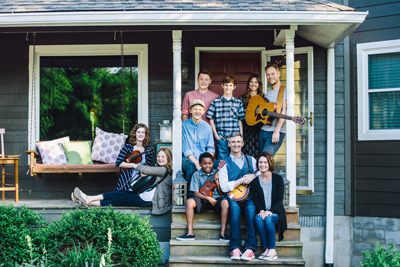Fatherhood, family & friendship—Touring and family life are now synonymous for the Goodgames and Petersons, how do they parent so well on the road? (all photos: Daniel C. White, website/@DanielCWhite)
We might not realize that our favorite artists, the women and men who visit the music venues around us, have lives of their own. Many of them wave goodbye to a spouse and kiss their children goodbye countless times each year as they seek to share their music and message with fans, old and new. It’s the sacrifice they make to leave home for the calling they feel to use the platform God has provided.
Two of our favorite songwriters have erased the lines that traditionally divide home and highway. Both Andrew Peterson and Randall Goodgame have walked the well-worn path of leaving family members behind for another run on the road. However, in recent years, both of these fathers-of-three have learned to ingratiate their families with their musical gifts for a new approach to their artistry—and a newfound joy in making music.
Andrew Peterson and his wife, Jamie, have three children: Aedan (17), Asher (15) and Skye (13). Peterson’s earliest recordings and tours featured his wife singing along, but these days everyone has found a place within his music. Asher played drums on the release tour for The Burning Edge of Dawn. Skye often sings both on records and at various shows. Aedan not only joins in musically, but he’s also provided the illustration for his dad’s album covers.
Most recently, Peterson’s work as an author of the Christy Award-winning Wingfeather Saga—a four-book fantasy/adventure novel series for young adults—has given him another artistic outlet with which to impact families. A Kickstarter campaign to animate the young adult series was overwhelmingly successful, which means Peterson’s books will soon be pitched as a multi-season animated series with some of the folks behind Veggie Tales and How to Train Your Dragon hard at work on the project.

photo: Daniel C. White / danielcwhitephotography.com
Randall Goodgame has found success both as an independent artist and songwriter for bands like Caedmon’s Call, Andrew Peterson, Jason Gray and others, but these days, his heart is pouring everything into the highly successful children’s music series Slugs & Bugs. The recently released Sing The Bible Vol. 2 features scripture songs tied with memorable melodies and is the fifth album in the catalog. Goodgame’s wife, Amy, and their three children—Livi (15), Jonah (13) and Ben (8)—can be heard on multiple recordings, and Livi even joined him for a recent U.K. tour, taking her studies on the road.
We recently sat down with these longtime friends and family men for a closer look at fatherhood in the limelight.
ON HAVING A PHILOSOPHY AS BOTH PARENT AND ARTIST
Randall Goodgame: I don’t really have a working thesis for being an artist as much as I do have a working thesis for being a disciple. It sounds super churchy, but being an artist means that you are trying to be a good steward of the gifts and the role you’ve been given as an artist. You find out what that means and you do that. When I think of fatherhood, it’s the same way. We have been given kids, so now, not only am I the leader of the home, but I need to shepherd these kids.
Andrew Peterson: As a songwriter, and from a vocational standpoint, a vocation in the Christian original meaning of the word like calling, I’ve felt called since I was about 19 to use my gifts as best I can for God’s kingdom, whatever He says that looks like. I’m always trying to decipher that and be obedient and live that out. When it comes down to parenthood, what we have tried to do is to reflect that idea to our kids, to help them find their calling. We want to demonstrate what it looks like to stumble along and try to let God direct your steps with your life.
How do you first assess the gifts you have been given? With the help of community. That’s what I hope for my kids, whether they are artists or whatever it is they are doing. It’s less about a philosophy of the arts than it is about discipleship and being obedient with the gifts you’ve been given. I want my kids see what it looks like to take these crazy gifts and find a home for them in the kingdom. Then I want them to find their gifts and ask God how they fit in the kingdom, too.
ON HOW BEING AN ARTIST AFFECTS HOW THEY PARENT
RG: Being an artist has influenced how we teach our kids. I can think of lots of opportunities they’ve had to grow and learn about the gospel because I am an artist. I know Andrew [Peterson] talks about the gospel throughout his entire show, and when he’s on the road with his kids, they’re hearing him talk about Jesus. He’s not going to have to worry that they’re twenty-five years old and don’t really know the gospel, you know? I think that way about my kids, too, as they come out on the road with me. They’ve heard me articulate the gospel so much. As a Christian and an artist, that’s a blessing and a gift.
AP: I don’t have bitterness towards my parents or how they raised me, but I did grow up in a culture that didn’t really value the arts. My parents did to a point, but I always felt like I did not have a place. What do I do with this? All my friends are doing everything else and I didn’t know anyone else who was doing what I was doing. In our house, we’ve tried really hard to show that stories matter and books matter and music matters and art matters.
Finding a way to express those things is a really high calling, so we try to fill our home with as much good music and good movies as we can. Randall [Goodgame] is so much better at this than I am, but he teaches his children music. When they were younger, he would wake up and teach them music. I’m so not good at that, but we try to leave the guitars out. I’m a big believer in leaving the paintbrushes out, so to speak, and we let the kids explore and show that this is a good way to live out your days. We’re trying to find ways to make things beautiful.
RG: Also, who better than mom or dad to model gospel-minded repentance? Sure, I hope I provide a good model of forgiveness, of mercy, of care for the poor, of patience, of courage and stewardship, but for their life with Jesus, they will definitely need humility. They will need to learn how to repent and return to relationship. For better or worse, however we handle our mistakes, that is the blueprint for how our kids will handle theirs.

photo: Daniel C. White / danielcwhitephotography.com
ON GETTING SENTIMENTAL MAKING MUSIC WITH THEIR KIDS
RG: I remember when Livi sang a harmony part on “Two Shirts” for the first time that wasn’t there. It wasn’t in the song, and she added it. She just knew what to do, and it was great. I still remember it. I don’t know where we were but I remember the feeling. It all hit me at once like, “Oh my gosh, she’s good enough to just do that.” Then it was, “Oh my gosh, I get to do this with her.” After that it was, “Oh my gosh, she’s singing the gospel!” The harmony came on the last line, about whoever wants to be first must be last and servant of all, and I was so glad it was the end of the song, so I could collect myself.
AP: When I’m rehearsing with the family, I’m the bandleader but I’m also the dad. I’m in charge of pushing them to excellence, but I’m also in charge of shepherding their hearts and being gentle. The first time we took out the family band, I was exhausted. I’m used to playing with players who show up at the rehearsal and already know the songs versus ten and twelve year-old kids where I have to teach them how to play a G-chord. I was like, “Is this worth it?”
We did six or seven shows together, and the first show was pretty scary. There were mistakes and tears. But at the end, I had this amazing realization. They would come out with me and play the first four or five songs, and then I’d take the middle part of the set, and then they would come back out at the end of the show. When they left, I missed them! I would think, “These songs sound kind of wimpy and empty without them.”
It wasn’t that I was indulging my kids. I actually needed them. What you want is to forget there’s a band playing with you. You want to play the music and not think, “Are they going to hit the right notes at the right time?” because you’re fully engaged with the audience. You want to trust the people behind you. By the end of the tour, there were several moments, where I realized that they were holding it down like that, and I could barely finish the song. I was so proud of them.
ON APPRECIATING EACH OTHER’S ART FOR THE FAMILY
AP: Skye went to sing background vocals on the first Sing the Bible record. Randall [Goodgame] is always so good about inviting our kids. We’d get the call, and she’d get excited about singing on the record. She came home one day from that session, and she was filling up her drink at the fridge’s waterspout and she was singing, “Therefore, there now is no condemnation for those who are in Christ.” I said, “Wait, what song is that?” She said “Oh, that’s one of Mr. Randall’s songs.”
She took a big swig and I was like, “That is the verse? Those are the verses that he’s putting music to?” Those are verses that have taken my whole life to understand. The fact that he’s writing music that is getting lodged in her head to where she is just singing it to herself while she walks around the property… I got a lump in my throat when that happened. I thought, “If only I had begun to pay attention to those verses when I was twelve! Then, I’d be perfect!” [Laughs]
RG: To see my friend create something so fantastic with the Wingfeather Saga had its own just sweet pleasure for me. My kids are readers. They love to read, and they’re discerning readers. My son Jonah’s favorite book is still Watership Down, and Livi was reading it for the third time the other day. They like great books and when they found out that the Wingfeather Saga was maybe going to be an animated series, they flipped out. They were like, “Let me see your phone! I want to see the Kickstarter video about it.” Then they watched it over and over again.

photo: Daniel C. White / danielcwhitephotography.com
It’s because the story was so captivating for them. They grew up with them. When they were little, I read them to them. When Jonah finished the Wingfeather Saga, he said, “I cried, dad. I just cried and cried at the end.” I’m going to get teary right now just thinking about it, but we talked about the gospel and he totally got it at eleven. He got it. Right away, in our conversation, we were talking about Jesus!
ON THE BEST ADVICE THEY’VE RECEIVED AS PARENTS
RG: For me, it was from our friend Bob Goff. He taught me to try and say “yes” more to my kids. He challenged me to think of how much God says “yes” to me. I get “yes” from God thousands of times every day. “Yes, you can wake up. Yes, you can breathe. Yes, you can make breakfast, enjoy eggs and toast, make coffee for your wife and hug your kids as they stumble into the kitchen rubbing their eyes.”
Of course, just like God, I still say “no: many times a day. We don’t watch television on school nights, but they still ask. We don’t have dessert every night, but they always ask. They ask for crazy stuff like, “Can I ride on the roof of the car while you drive?” and we say “no” because we’re sane. But I used to say “no” as my default. Now, I look for chances to say “yes” that surprise them. Once they kept asking for “one more” Oreo cookie and I kept saying yes until the package was empty. You can’t do that every time, but it sure is fun sometimes.
AP: Make sure your kids know that you like them. When Jamie and I first got married, some good friends gave us tapes of their father’s Bible college teaching on marriage and family. I think the title of the series was How to Raise Kids You Can Like. It was a revolutionary idea to me at the time, and his teachings helped us create an environment in which our kids never thought they were the center of the world, and yet their identity as children of God was affirmed over and over again.
It’s not that they’re perfect, but that they’re perfectly loved by God. We want them to know that we delight in who they are. One of the things he said was that most kids, if asked, would say that their parents loved them. But if you asked if they liked them, a lot of those kids wouldn’t be so sure. It’s one thing to feed and clothe your kid. It’s another to know about their favorite bands, to enjoy conversation, to invest as much in their hobbies as their grades, to treat them like people who may teach you at least as much as you teach them.

 Listen Live
Listen Live
Leave a Reply
You must be logged in to post a comment.